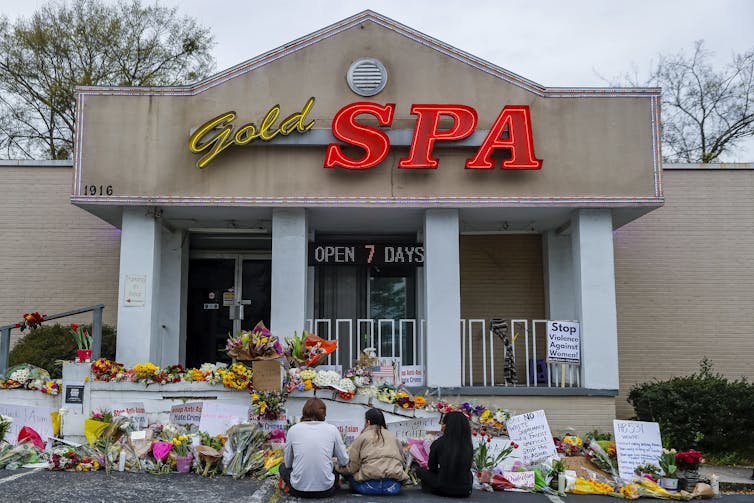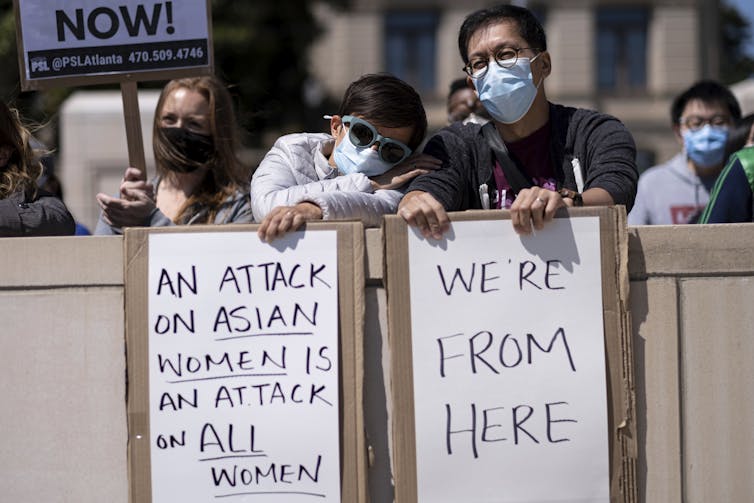The same racist sexism exists here
- Written by Tegan Larin, PhD Candidate Monash University XYX Lab, Monash University
The recent US shootings[1] at massage businesses in Atlanta should ring alarm bells in Australia. Eight people were killed in the attacks, including[2] four Korean women and two Chinese women.
US authorities are still trying to determine the exact motive[3] behind the attack by a 21-year-old white man, who is a suspected sex buyer[4].
But some feminist groups, such as Asian Women for Equality[5], immediately identified misogynist racism as a key element behind this sort of violence. As one member of the group, Suzanne Jay, said[6],
Men are being trained by the prostitution industry. They’re being encouraged and allowed to orgasm to inequality. This has an impact on Asian women who have to deal with these men.
The global sex trade, feminists have argued[7],
increasingly contributes to the dehumanisation of all Asian women.
Indeed, it has been reported that the Atlanta shooting suspect explained[8] the attacks were a form of vengeance to eliminate the “temptation” for his “sexual addiction”.
 Mourners pause at the scene of two of the massage parlor shootings in Atlanta. Erik S. Lesser/EPA
Mourners pause at the scene of two of the massage parlor shootings in Atlanta. Erik S. Lesser/EPA
How Australia’s massage businesses operate
Like the US, Australia’s “massage parlours” are associated with the prostitution of Asian women. These venues, outwardly presenting as massage businesses but offering illicit sexual services, make up the majority of brothels in the city I study, Melbourne.
Australia’s commercial sex industry is regulated at the state and territory level, resulting in a patchwork of differing models.
In Victoria, massage parlours are estimated to outnumber legal brothels five-fold[9]. My research on Melbourne’s massage parlours supports[10] this estimate.
Read more: Will Victoria be the first place in the world to fully decriminalise sex work?[11]
Despite the main purpose[12] of Victoria’s Sex Work Act to “control sex work”, the majority of Victoria’s brothels get around the legislative requirements and controls by operating under the guise of legitimate massage businesses.
Massage businesses are usually considered a general retail premises in most council areas, which do not require a planning permit or registration.
Australia’s sex industry is also heavily reliant[13] on a culture of sexualised racism.
An analysis of online[14] massage parlour advertising conducted as part of my research shows ads commonly feature images of Asian women in suggestive poses. The wording highlights race or ethnicity, with such phrases as “young and beautiful trained girls from Korea, Hong Kong, Taiwan, Singapore, Vietnam, China and Malaysia”.
Read more: New report shows compelling reasons to decriminalise sex work[15]
In addition to ads, my research also examined online sex buyer review forums. These typically encourage[16] men to include descriptions[17] of “ethnicity, appearance, breast size”, ratings of the women’s body parts and the “services” received.
These sex buyer reviews not only demean and denigrate women, they also promote the sexualised and racist stereotypes that pervade the industry.
Perhaps unsurprisingly, a recent study of sex buyer reviews of Australia’s legal brothels found[18]
that sex buyers actively construct and normalise narratives of sexual violation and violence against women.
The effects of sexualised racism in prostitution
This blatant racism, misogyny and male sexual entitlement is not confined to massage parlour owners or their customers. It’s also embedded in Victoria’s Sex Work Regulations[19].
The updated regulations now allow advertising to reference “race, colour or ethnic origin of the person offering sexual services”. This means that Victoria’s sex industry legally promotes women from minorities as an eroticised “other”.
Read more: US has a long history of violence against Asian women[20]
This normalisation of sexualised racism promoted by the sex trade in Australia may have wider effects.
A Korean-Canadian doctor, Alice Han, for example, recounted[21] to the ABC being asked twice in a span of 12 hours in regional New South Wales whether she was a sex worker.
She said this exemplifies “a pattern of demeaning stereotyping and racial profiling” of Asian women in Australia, and the association[22] of Asian women with prostitution more broadly.
Australia’s sex industry also relies on the migration and trafficking of Asian women for its survival.
Indeed, Australia’s sex industry is rife[23] with modern slavery for the purposes of sexual exploitation. Cases have been found in both legal[24] and illegal[25] brothels, signalling the wholesale failure[26] of prostitution legislation in this country.
This raises questions[27] about the model of total decriminalisation being proposed[28] in Victoria. This model seeks[29] to decriminalise not only those exploited in prostitution but those who profit from them, such as pimps, brothel owners and sex buyers.
The best path forward
Australia is increasingly behind the rest of the world when it comes to approaching prostitution from a gender equality perspective.
Indeed, the UN Convention on the Elimination of All Forms of Discrimination Against Women (CEDAW) has consistently reprimanded[30] Australia for not meeting its requirements to reduce the demand for prostitution.
In order to address the mix of racism, misogyny and men’s sexual entitlement that prostitution is founded on, Australia must adopt a new national framework. The Nordic or “Equality” model[31] offers one path forward — it decriminalises those working in prostitution, but not those who exploit them.
 A ‘stop Asian hate’ rally outside the Georgia state capitol in Atlanta. Ben Gray/AP
A ‘stop Asian hate’ rally outside the Georgia state capitol in Atlanta. Ben Gray/AP
This model, which has garnered support from survivors of prostitution[32] and anti-trafficking organisations[33] around the world, includes robust social services to support those in the sex trade and assist them into transitioning to other industries.
We know prostitution relies on the abuse of the world’s most marginalised women and girls in order to function. It is predominantly Asian and migrant women who suffer on the front lines of Australia’s sex trade.
While the national conversation confronting[34] society’s acceptance of sexual violence is well overdue, we cannot ignore the sexism, misogyny and racism bound up in Australia’s sex trade.
References
- ^ US shootings (www.washingtonpost.com)
- ^ including (prostitutionresearch.com)
- ^ exact motive (www.reuters.com)
- ^ a suspected sex buyer (www.nytimes.com)
- ^ Asian Women for Equality (www.awcep.org)
- ^ said (www.cbc.ca)
- ^ argued (prostitutionresearch.com)
- ^ explained (www.nytimes.com)
- ^ five-fold (www.sbs.com.au)
- ^ supports (journals.sagepub.com)
- ^ Will Victoria be the first place in the world to fully decriminalise sex work? (theconversation.com)
- ^ main purpose (classic.austlii.edu.au)
- ^ reliant (journals.sagepub.com)
- ^ An analysis of online (www.taylorfrancis.com)
- ^ New report shows compelling reasons to decriminalise sex work (theconversation.com)
- ^ encourage (www.heraldsun.com.au)
- ^ descriptions (thenakedtruth.reviews)
- ^ found (journals.sagepub.com)
- ^ Sex Work Regulations (content.legislation.vic.gov.au)
- ^ US has a long history of violence against Asian women (theconversation.com)
- ^ recounted (mobile.abc.net.au)
- ^ association (www.abc.net.au)
- ^ rife (www.collectiveshout.org)
- ^ legal (www.theage.com.au)
- ^ illegal (www.heraldsun.com.au)
- ^ failure (theconversation.com)
- ^ questions (www.policyforum.net)
- ^ proposed (www.vic.gov.au)
- ^ seeks (www.catwa.org.au)
- ^ consistently reprimanded (www.catwa.org.au)
- ^ Nordic or “Equality” model (www.catwa.org.au)
- ^ survivors of prostitution (www.spaceintl.org)
- ^ anti-trafficking organisations (catwinternational.org)
- ^ confronting (www.bbc.com)













